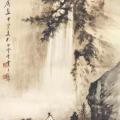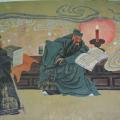3. Karyn Lai on Classical Chinese Philosophy
Posted on
Co-host Karyn introduces herself to the listeners and talks about the challenges of tackling classical Chinese philosophical texts.
Themes:
Further Reading
• K 'Contempt, Withdrawal and Equanimity in the Zhuangzi', Emotion Review, 15 (2023), 189 - 199.
, 'Freedom and agency in the Zhuangzi: navigating life’s constraints', British Journal for the History of Philosophy, 30 (2022), 3 - 23.
• Lai K, (ed.), Knowers and Knowledge in East-West Philosophy: Epistemology Extended, (Cham, Switzerland: 2022)
• K Lai and W.W. Chiu (eds), Skill and Mastery: Philosophical Stories from the Zhuangzi (London: 2019).
, 2018, 'Learning to be Reliable: Confucius' Analects', in Lai K; Benitez R; Kim HJ (ed.), Cultivating a Good Life in Early Chinese and Ancient Greek Philosophy (London and NY: 2018), 193 - 207.
• K Lai, An Introduction to Chinese Philosophy, 2nd ed. (Cambridge: 2017).
, 'Ren 仁: An Exemplary Life', in Olberding A (ed.), Dao Companions to Chinese Philosophy, (Berlin, 2014), 83 - 94.
• K Lai, "Knowing to Act in the Moment: Examples from Confucius’ Analects," Asian Philosophy 22 (2012), 347-64.
• K Lai, "Li in the Analects: Training in Moral Competence and the Question of Flexibility," Philosophy East and West (2006), 69-83.






Comments
Will we get more interviews of Lai in the future?
Wonderful interview, will you be interviewing her again in the future like how you've interviewed Jeffers multiple times (a shame we didn't get an interview with Ganeri).
Also do you plan on covering other themes that may be philosophical in your coverage of Chinese Philosophy like how you covered in Western Philosophy; such as Poetry, Music, Mathematics, Science/Natural Philosophy, Aesthetics, Rhetoric?
In reply to Will we get more interviews of Lai in the future? by dukeofethereal
More interviews
Yes there will be some other themes, like definitely poetry and music (I am due to write a script on that soonish for the Confucianism series).
We might do a final interview with Karyn? We haven't thought that far yet though... we got lucky because I was in Aberdeen at the same time as her last year so we did this then, but we could always do another one online.
In reply to More interviews by Peter Adamson
Interview guests
I'm curious if interview guests have been decided. Will some of these guests be the authors cited in the bibliographies - e.g. Chris Fraser. I've found Lea Cantor's work illuminating, both on classical Chinese philosophy (e.g. interpreting Zhuangzi's 'happy fish' passage) and on the practice of history of philosophy.
Do you also have plans of covering (in this or later series) how contemporary philosophers practice global or fusion philosophy by drawing, for instance, on two or more thinkers and theories, including ones covered in HOPWAG so far? This might be a bit outside the scope of HOPWAG, though.
(Also gentle reminder to use giraffe in China artwork if and when relevant in the series! Hiawatha would be pleased!)
In reply to Interview guests by G. Tarun
Giraffe in China
We will have an opportunity to use the giraffe I think - there will be an episode about animals in the Zhuangzi!
One the interviews, that is a bit of a moving target, we always have for each series some ideas for people to invite, then people who have been invited but not yet recorded, and then people who have already done it but the interview is not published yet (Franklin Perkins, in this case). That’s why I don’t usually say who will be appearing in advance, it is all too nebulous.
On the happy fish: I actually wrote a paper which talks about that passage, recently, and draws on Lea’s work! I agree, it is a super interesting piece. I can send you my article if you want to email me.
And finally, on the fusion issue: that’s an interesting thought. I guess it wasn’t really part of my plan though maybe we could have an episode towards the end of this series (even with Karyn again perhaps) about the various ways that modern-day philosophers have engaged with Classical Chinese thought, and your idea would fit in there. One thing I’ve noticed already working on these episodes is that a lot of work on Chinese philosophy is comparative, like, say, Confucius and Aristotle on virtue. My instinct is that for HoPWaG the right approach is not to be comparative but to look at each tradition in its own right. But soon I’m actually writing a script on “Confucian virtue ethics” and in that case the comparison to Aristotle is pretty much unavoidable. Still I think that as with India, we want to avoid suggesting that the best or only way to explore, and even legitimate, these non-European traditions would be to compare them to European ones. Of course one can also compare Chinese and Indian philosophy and before long we’ll have those streams meeting when Buddhism comes to China so that will certainly be part of our story.
Feed not working in Google Podcasts
Hello, loving the podcast, but the feed is not working on Google podcast - it only leads to the main show, History of Philosophy
Kind regards
In reply to Feed not working in Google Podcasts by Toke Kløve Junge
Google podcasts
Yes we know about that - we have been unable to fix the link unfortunately. But we're trying to set it up on YouTube Music, apparently Google Podcasts is being folded into that anyway.
Feed Limit
I do not know if you have already noticed, but it seems the "non western” feed has a maximum of 200 episodes, meaning that every week one of the old Indian philosophy episodes disappears.
Maybe this was on purpose, if not it would be nice to increase the limit so it can keep reaching a wider audience.
In reply to Feed Limit by Y
Feed limit
Which platform are you talking about? The various platforms seem to have different limits, like with Apple I think it's 300, Spotify has a different limit, etc. Since this is just a general rule there isn't much we can do about it, annoying though it is; but for instance on Apple I think the limit becomes irrelevant if one "subscribes" or at least that's how it used to work.
In reply to Feed limit by Peter Adamson
Podcast Feed
I personally use pocket casts as my main podcast app. I have no idea behind the technology behind it and how this differs betweens apps, other than that a RSS feed is involved...
A quick search shows me that Spotify has the same problem (limit?), the first 9 episodes have disappeared there as well.
In reply to Podcast Feed by y
Feed
Ok, thanks - maybe you can “follow” or “subscribe” to the series and see everything?
In reply to Feed by Peter Adamson
feed
I already am subscribed, I don't think that makes a difference.
After trying sever other podcasts services, it seems that the first 10 episodes are missing everywhere except on podbean (the host?). I'm not quite sure if this means there is some kind of limit set in the account or if the host is limiting the external feed for some reason.
Strangely the western podcast doesn't have the same problem.
Add new comment